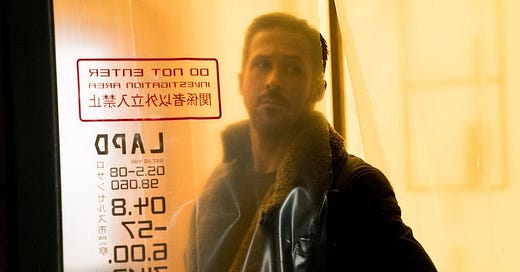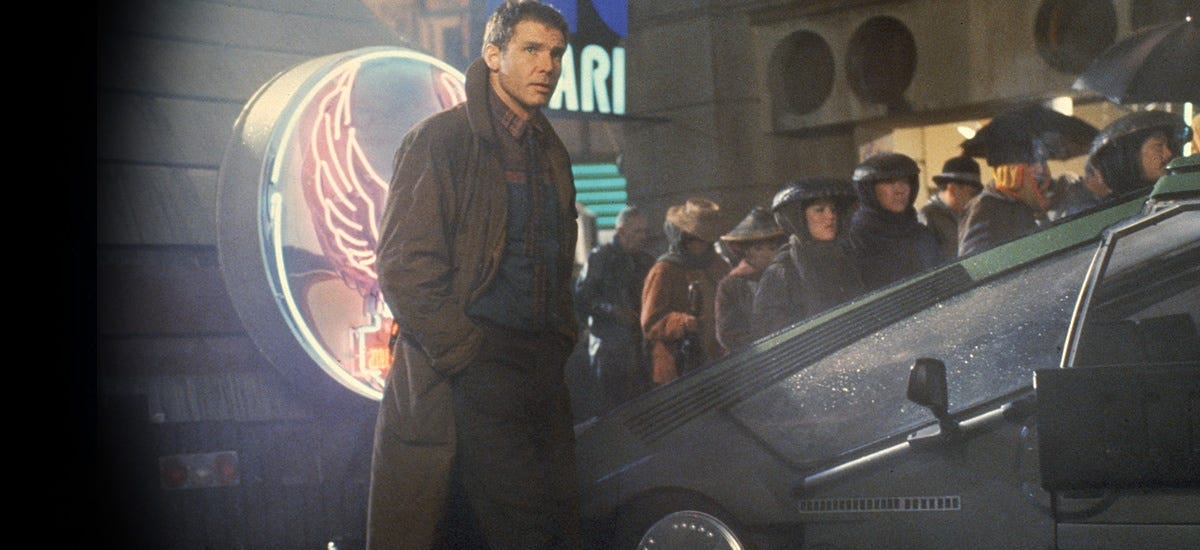Everything Is Existential: A Collection of Thoughts on Blade Runner 2049
Be warned, there are many spoilers herein.
Back in 2016, I visited the set of Blade Runner 2049 for Empire magazine. The studio was located on the outskirts of a Budapest ceding into a gloomy autumn, the city still a mix of Mitteleuropean splendour and Soviet Bloc brutalism. Security was tight, especially when it came to plot revelations. The NDA stacked up like a phone book, and even character names at that stage — bar Deckard — were to be kept on the down low. Elusive, embarrassed smiles were our constant answer: “We can’t reveal that at this stage”. Canny journalists that we were, we spied names on prop boxes (“Luv's gun Mk1”) and coat racks (“K’s overcoat hero”), detectives on the job.
The story was anyone’s guess.
Nevertheless, the shooting was spectacular. As the cold night drew in, they were staging the climactic fight between Luv and K, the crashed Spinner tossed by the surf (generated by a clattering wave machine in the ink-dark tank) the only light source. How the new film luxuriates in Spinner dynamics, gliding serenely through the brutal monumentality of Los Angeles or sent crashing earthwards like Icarus. They are the sought after moments of transcendence.
Like many others, Blade Runner has been on my mind since the day I saw it in 1982. A familiar memory: a local cinema, aged 13, drawn by the lure of Han Solo, and leaving to the embrace of the night uncertain of whether I had exactly enjoyed myself. I’ve written about it frequently in my career, maybe more than any other film. Some films become a habit. And if the online response to the sequel is anything to go by — less so the box office (that is history replicated) — that urge is widespread. Denis Villeneuve has made a career out of the affliction.
As we spoke over the following months, the French-Canadian director — an engaging, honest man — was almost pained in his need to explain this was not Blade Runner, but his (blush) response to Blade Runner. His Blade Runner. How could it be otherwise? This is the world not only thirty years more decayed, more sprawling and awesome, but a world seen through his eyes.
Watching 2049, succumbing to it, you can’t help but be overwhelmed. The effort is immense, the level of thinking involved awe-inspiring — every second feels measured toward some inner devotion to perfection (nothing left to chance). Even its elusiveness and ambiguity are precisely calibrated.
It’s an extraordinary sequel, towering over an era of filmmaking contorted by the algorithms of nostalgia.
Why then did some part of me leave dissatisfied?
Roger Deakins, the justly celebrated cinematographer, has wrought images predisposed to flabbergast. Cause and effect have been knowingly conjoined; story and telling inseparable. What could be more cinematic? Yet Scott, as visualist, was, and is, prey to an inner drive he will never be able to fully articulate (even to himself). His worlds — and this future LA more than any other — are holistic and elemental in ways that aren’t a matter necessarily of choice. His Blade Runnerwas partly subconscious.
As Agent K, Ryan Gosling dutifully stows his performance on the inside. But could they have held his Replicant identity back a little while at least? Everything is existential, from the opening farmhouse salvo to the bittersweet close.
I loved those mesmerising debriefing cum psych-evaluation, sort of anti-Voight Kampff tests (designed to detect human responses): “interlinking”… “cell” … “interlinking”...
The sighting of a copy of Pale Fire — indeed the citing of Pale Fire in K’s wacky examinations at the high-rise LAPD HQ — is significant. Nabokov’s novel is structured as a commentary on an older poem, and the reference smacks of a high-functioning in-joke about Villeneuve commenting on Scott’s great poem.
Literary allusions abound. For all his magisterial visual texture, Villeneuve also possesses a cool Kubrickian bookishness.
K, the foreshortened serial number that gives Gosling’s hero his identity (if not a name — name’s imply a soul), alludes to Kafka’s quasi-autobiographical hero Josef K, wandering the cold city confounded by a social system whose mechanics and motives he cannot grasp (the eternal outsider). He might also be K for Kubrick. Later, as he begins to slip the bonds of his Replicant nature, K is rechristened Joe. An ordinary Joe as it turns out.
2049 is far more Kafka than Chandler. Something of Budapest has been rubbed into its grain, giving it a sullen Eastern Bloc feel – the gigantic sea wall an echo of a spliced Berlin, keeping out the raging ocean of the West — the cityscape as oppression.
On set, Dennis Gassner, the quirkily-brilliant production designer, boiled his entire approach down to the word “chaos”. Chaos as a theme.
Of course, K could equally point to Philip K. Dick. He who originally dreamed of electric sheep. And Villeneuve draws close again to the source: the elusiveness, the paranoia, the edge of reason.
Nobel laureate Kazuo Ishiguro’s Never Let Me Go — and Marc Romanek's wooden adaptation — pondered a similar existential Litmus test for the soul. If his clones (neé Replicants) can love have they discovered what it means to be human? That’s still the big question: what is it that makes us human? K’s relationship with his pretty AI is a flood of yearning and narcissism (surely, she only ever responds to what he needs). Technology has made everything unreal.
How many $150m films nod their furrowed brows toward Tarkovsky? Or Wim Wenders? Or John le Carré? Or Godard's Alphaville? The quest is always inwards.
The source of my itch might lie in the very fact that I am so haunted by the memory implanted in 1982. I wanted the new film to revive that feeling — feed that desire. Or to lay those ghosts to rest. I am fully aware I am asking too much of Villeneuve’s mighty accomplishment. But I think he felt the same thing.
The score from Hans Zimmer and Ben Wallfisch is a strange brew. I’ve listened to it in isolation — I’m listening to it now— and its slow, ambient waves (a recalibration toward the original, we have been told, after the late Jóhann Jóhannsson’s earlier efforts were deemed absent of the right vibe) keeps swelling toward something lyrical and Vangelisish, before either dissipating into the orange air or slamming into us with industrio-synthetic foghorns. It feels like an urge to disrupt the enchantment.
Why not employ Vangelis?
I felt the loss of whimsy. Scott’s early films, maybe all of them, to varying degrees juxtapose the hard-nosed with the fairy-tale — the grim and the Grimm. It's that subconscious insistence. How he innately drifts into the fabulous, connecting his thrillers to a Jungian universe of shadows and unicorns (the trigger motif is now a horse). For all its snow-dappled beauty, Legend’s failing may be that it doubles down on the fairy-tale aesthetic and becomes overwrought. Alienand especially Blade Runner located the perfect equipoise between a science-fictional extrapolation of reality and the world of dream. The future was made from old films and books and memories. And something deeper.
The secondary characters, even the extras, were once exotic. Some, like M. Emmet’s Walsh’s sniggering, rough-hewn Bryant fixed their bearings to the fifties noir that seeped through the story. Others like William Sanderson’s sad-sack toymaker, the lonely J.F. Sebastian with advanced decrepitude to mirror the beautiful Replicants abrupt lifespan, or James Hong (“I made your eyes”) as Hannibal Chew (even the names sounded far off) in his frozen workshop, were otherworldly (Offworldly?) and witty.
Yes, Blade Runner was funny too.
Every encounter in the original was as real and unreal as Alice in Wonderland. In 2049 there is something procedural and hard-wired about K’s journey where the characters he confronts are as gritty and burdened as the landscape (they are all too real and unreal). Until, more by chance than destiny, he finally unearths Deckard in an irradiated Vegas (well, I took it to be the former Sin City) with a corona the colour of Corona (a reference for those who saw the original on release) and we head toward revelations that I hadn’t guessed at but didn’t strike me as truly profound.
Wait, were those bees real?
In 2049 the casting is too orderly, too young. Robin Wright and Jared Leto work hard to offer a vibrancy to functional roles, but they slip from the mind. Edward James Olmos’ cameo as an aged Gaff does little but stress his humanity (unless he is another secret Replicant with a lingering lifespan) and all-knowing origami.
Wait, was that a sheep he folded?
The Replicants of old were petulant infants and fallen angels. Rutger Hauer’s magnificent Roy Batty gave the original its defiant heartbeat, and a streak of insane humour. There is nothing in 2049 to match his rooftop valedictory of heavenly visions, or Pris’ over-sprung gymnastics. Only Hauer’s vivid, fellow countrywoman Sylvia Hoeks provides something of that splendid oddity as the Replicant henchwoman Luv, weeping unbidden tears with every kill as if she is about to burst.
The divide between humans and Replicants has been narratively blurred. There is no longer a need for a Voight-Kampff test — K knows his quarry: the difference between old models and new (the foggier provision for a Blade Runner’s case file). This is clearly a deliberate move, but I began to wonder madly if everyone was a Replicant and humanity had fled Offworld leaving this simulacra society to establish its own fractured caste system (what could be more human?).
I was probably thinking too hard.
Housed in that haunted casino (which looks way more Grand Budapest than Caesars Palace), Ford is gruffly charismatic, but I couldn’t sense anything essentially Deckard about him. I kept trying to remind myself what it was that made Deckard Deckard. The emotional remoteness, the dogged devotion to his job, the aura of world-weary PI on his lonely beat? I wanted him to re-establish that identity. Or to talk it through, at least. “I had your job once,” he growls, but we get no further.
Rightly perhaps, he remains a ghost.
The actor's pointlessly short-lived revival of Han Solo felt closer to the past in that otherwise tiresome school reunion The Forced Awakens.
Still, the shaggy dog is a great joke. Is he real? Why don’t you ask him…
So is Deckard real? Villeneuve insisted to me this was never the point of his film, and is happy the ambiguity still sings unanswered through the orangeade sky. But the debate surely remains entirely the point — the question now being that as the father of the missing child, the messianic Replicant, whether he would need to to be human or artificial (Tyrell’s sperm-shooting Adam to Rachael’s Eve) to impregnate his now deceased lover. Was he truly a special edition?
So even if he has aged, the game is still afoot.
“It’s something in his eyes…” Gaff recalls of why Deckard needed to flee. Eyes: that was how you could tell…
Deckard quoting the long lost Ben Gunn from Treasure Island — “You mightn’t happen to have a piece of cheese about you?” — recalls that other Blade Runner, Holden, on life-support in a deleted scene, reading Robert Louis Stephenson’s pirate fable. And the hint was that they were all skin jobs deep down.
And what of K? Is it in his actions, his thwarted desire, his longing for a place at the human table, that he locates that elusive soul? Has he, like Batty, tasted the sublime agony of being 'real' before his time to die?
Sadly, such vagueness doesn’t haunt me as it once did. It felt too deliberate. Too determined.
And yet, deep down, I know I will see 2049 many more times.
Maybe I will come to see it with new eyes.




